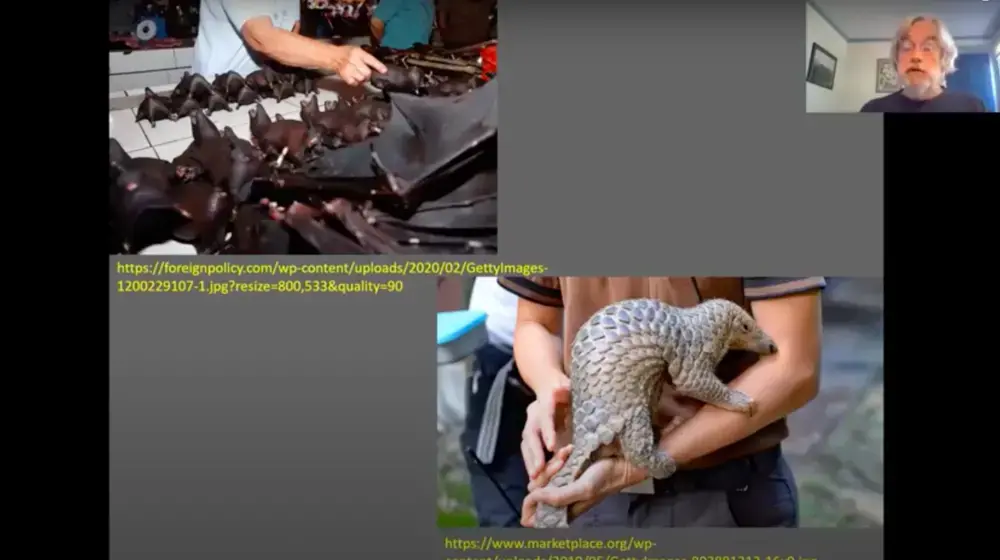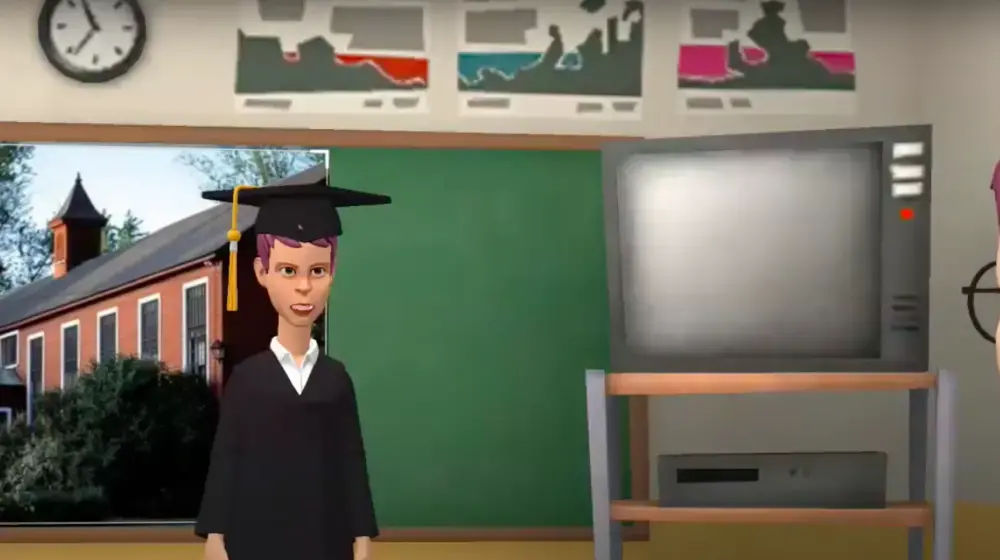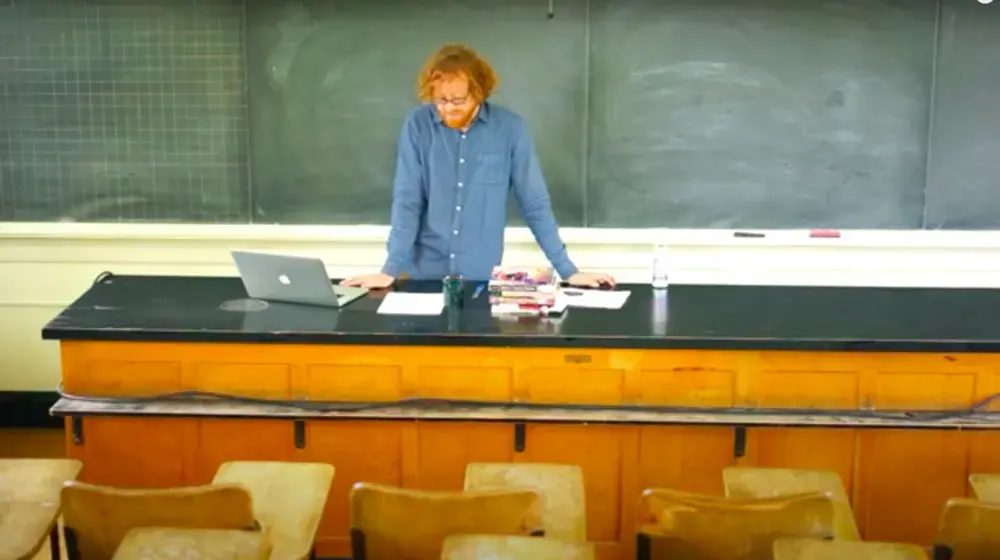Studying the Era of COVID-19
Over the summer, the pop-up course Understanding and Responding to COVID-19, Crisis and Quarantine gave Bennington students, staff, faculty, alumni, and community members a chance to connect with one another while examining the unfolding COVID-19 crisis across disciplines, from anthropology to mathematical modeling to poetry to film.
In the midst of a global pandemic, it is hard to forget how drastically responding to and coping with COVID-19 has altered our lives and communities.
Beyond experiencing the crisis and its repercussions on a personal level, for seven weeks this summer, over 70 Bennington students, staff, faculty, alumni, and community members also approached COVID-19 from an academic standpoint. Understanding and Responding to COVID-19, Crisis and Quarantine, a two-credit pop-up course examined the unfolding pandemic from myriad perspectives—anthropology to mathematical modeling to poetry to film and more.
This course was developed as an institutional response to the global disruption of COVID-19, and inspired by student and faculty input, becoming an online gathering place to have sophisticated conversations about the moment.
“Speaking with both students and faculty, we saw a real desire for people to come together and begin discussing what these incredibly difficult times mean to them,” said Noah Coburn, faculty member and Associate Dean for Curriculum and Pedagogy, who organized and facilitated the course. “Bennington’s flexible and responsive curriculum is really designed to respond to student needs and faculty interests, and we took advantage of that."
“In school, we usually study things that happened in the past, but this is a class where we’re studying something that’s happening right now, that students and teachers are actually living through,” said Sydnie Hyams ’22. “That offers an interesting new perspective on the topic, rather than when we learn about something where none of us was actually there.”
Widening Perspectives
Hyams was intrigued by the fact that Bennington was offering a summer class and decided to sign up. Since enrolling, her perspective on COVID-19 has widened.
“Through learning each week about the facets of what COVID-19 affects, I've learned about different areas I'd never even thought about,” said Hyams. “We learned that environmental changes like global warming and deforestation can affect pandemics. I had no idea about that before, but now my final project revolves around that topic.”
In a session led by Biology faculty member Kerry Woods, the class examined COVID-19 as an ecological and evolutionary phenomenon.
“When deforestation happens, the separation between humans and animals becomes less, and we see with animals we never would have interacted with if these forests were still here,” said Hyams. “That closeness allows the virus to jump from an animal to a human quicker and in ways we’ve never seen before because of the elimination of the habitat.”
Usually, Hyams’s studies at Bennington center on Visual Arts and Media Studies. While her courses can encompass a variety of subjects, this summer’s COVID-19 course is more interdisciplinary than she has ever experienced.
“During each class meeting, we learn about a different area, which allows a variety of students who study a wide array of things to be interested in what we’re talking about,” said Hyams. “In class, it expands the pool of people we’re able to discuss with in a way I've never experienced before.”
Deepening Bonds
Among this expanded pool are members of Bennington’s Class of 2024, first-year students who have gotten an introduction to both Bennington academics and their peers through this course.
I feel more comfortable being myself in a classroom because I noticed you can really bring your story and lived experience
Ari Ivy '24
“COVID-19 is sometimes considered an adult issue,” said Tom Evans ’24. “Separate from the academic issue, I really saw an opportunity for young people to have discussions about COVID-19 and have them be considered valid. This class was an exciting opportunity to see how everyone else was coping with it. In the UK, it’s gone differently than in the US, and I was drawn to the course to be able to talk to different people with varying experiences. I wanted to see if my views could be challenged.”
Lauren Yanase ’24, who is interested in outdoor and environmental education, recently arrived at Bennington, following a gap year spent as an Education Intern for the Portland Water Bureau.
Taking the COVID-19 course helped Yanase “think about how outdoor education is going to change in a post-COVID world.” For her final project in the course, she developed a roadmap showcasing how students and visitors can adhere to public safety guidelines and salient restrictions while also getting into the environment and reconnecting with nature.
As an additional benefit, Yanase got to meet her peers at Bennington early and bond with them through fruitful small-group discussions within the course.
“On paper, I knew how diverse the Bennington student body was, but that didn’t really sink in until I realized how much of my small group was composed of international students,” said Yanase. “It’s been interesting to hear and recalibrate how I’m understanding the American COVID-19 crisis, as compared to the Pakistani COVID-19 crisis, for instance. I’ve learned a lot about their cultures and what this is looking like for them or their families, even if they're still in the United States.”
“The course has been nice because I feel like I am getting a little bit of insight into how the campus works. I’m growing more comfortable, even making a couple friends, which feels important and grounding,” said Ari Ivy ’24. “I feel more comfortable being myself in a classroom because I noticed you can really bring your story and lived experience.”
For current Bennington students, too, discussing and bonding with their younger counterparts has been a deeply rewarding experience. Sbobo Ndlangamandla ’21, who will graduate in the spring with a Plan in Public Action, admires the “amazing perspective” incoming students bring to the course.
“The elements of a Bennington classroom are still present in this course, with group discussions and casual conversations” said Ndlangamandla. “Initially, I was scared by the thought that it would be a big class, but we’re in small groups of six, so we can have a nice conversation. In my group, there are two incoming freshmen who are phenomenal. Connecting with them has been a plus of having things online.”
Another benefit Ndlangamandla sees for new students is that the course’s variety of faculty members “feels like an audit of professors.”
“Faculty members stayed true to who they are, even in this online class,” said Ndlangamandla. “Each presentation gives you an idea of their teaching style. If you’re thinking about taking one of their classes, this course is the time to see what they’re like.”
Within Ndlangamandla’s own life, the course has broadened how she thinks about the effects of COVID-19 beyond health and economics.
“We had one discussion where we talked about the role of big corporations in operations of the World Health Organization,” said Ndlangamandla. “There has been more interest in the effects that the products we buy have on legislation. The one thing that keeps going through my mind is the frustration that the toothpaste I use has more political power than I do. These companies, at the end of the day, dictate the work that organizations like WHO do.”
In response, Ndlangamandla has become conscious of her own purchasing power. She’s changed her buying habits to more closely align with her values, offering support to small businesses whose economic impact is local and easily traced.
“With the lockdowns, it has been cool to slowly move to buying more local products,” said Ndlangamandla. “I’ve had more time to shop in downtown Bennington. It’s fulfilling to support local businesses, to know I’m not contributing to corporations and that these small-business owners are getting the profit. Thinking about how I can change my own habits has been good and important for me.”
Providing Structure
For Pie Exley ’22, a benefit of the COVID-19 course was the structure it provided to her summer days.
What’s really Bennington is that we were able to pivot so quickly
Pie Exley '22
“A huge part of quarantine culture that I've experienced is a loss of time—it’s hard to differentiate a Tuesday from a Friday,” said Exley. “Having something to do and having people to check in with every week has been nice.”
One of the secondary goals of the course was to alleviate feelings of isolation over the summer for its participants. While this goal is an unusual one, Exley was most struck by how similar this online course was to other Bennington classes.
“For much of the College’s history, when you picture Bennington, you think it’s in person, not online. It’s 12 people per class; it’s one-on-one meetings with faculty,” said Exley. “But what’s really Bennington is that we were able to pivot so quickly to make online classes work.”
As a student co-leader, Exley took on an additional role in the course, focusing on the pedagogy of discussion and how to best represent a Bennington classroom, particularly for the first-year students in the course.
“The course is more independently led than usual; we break off into groups to discuss,” said Exley. “Without a large group discussion to come back to, there’s a feeling that your discussion in the small group is way more important—it’s your whole learning experience, so it makes people tune in. People are plugged in, ready to go, and give their all for the whole hour or two that we’re in a group.”
As a Literature and Education student, Exley appreciated Ben Anastas’s presentation Reading and Writing the Pandemic, which also featured projects by Hafsa Zulfiqar ’22, Grace Robins-Somerville ’20, and Ahwar Sultan ’22, but she equally enjoyed lectures on Physics and Geology by Tim Schroeder and Mariam Ghandi’s Film presentation.
“Mixing and matching those different ways to examine the current moment not only accepts people from multiple disciplines into one classroom, but it also shows there’s no wrong way to approach this topic,” said Exley. “In fact, if there is a wrong way, it might just be approaching through only one discipline.”
Gaining Agency
Biborka Beres ’21, who studies Dance, Drama, and Philosophy, has similarly found that this course has expanded her interests. Hearing about her peers’ projects in Ben Anastas’s class inspired her to write her own poetry about her pandemic experience.
“Thinking about how the pandemic affects day-to-day life, human relationships, and humanity, I was also able to think about the emotional or cultural changes that COVID-19 brings,” said Beres. “It activates all fields of experience, which puts me in direct engagement and conversation with it.”
Beres was equally inspired by Mariam Ghani’s lecture, which focused on a documentary Ghani had filmed about disease as a political metaphor pre-COVID and had revisited in light of the current pandemic.
“It was really eye-opening to think about how disease is framed,” said Beres. “A lot of times, it's actualized in terms of the current political environment—as an intruder, outsider, alien, something to fight off or something that attacks us from the inside. It’s not only a metaphor; it gains a whole personality according to what’s most feared in the current context of the world, and policies are adjusted accordingly.”
For Malhy Mendez ’20.5, who studies Sociolinguistics, one of the most interesting classes was Eileen Scully’s lecture on conspiracy theories.
From the belief that 5G cell towers cause COVID-19 to the thought that the virus was created by China as a means of controlling global economics, conspiracy theories have run rampant across both social and traditional media during the pandemic.
“There’s a lot of criticism from people with higher education and fact checkers, who think, ‘Oh my god, how could anybody ever believe this?’” said Mendez. “For me, coming from an immigrant community, I can provide some perspective of why people believe these theories: it’s because the language surrounding these theories is accessible.”
The language of conspiracy theories, said Mendez, is cause-and-effect and easily understood, particularly in translation, as opposed to more technical or esoteric information shared by the CDC or WHO.
“When these organizations translate their information into other native languages or dialects, there’s a lot of issues,” said Mendez. “The majority of people would rather trust the media outlets they already trust, and sometimes those outlets are the ones spreading those conspiracy theories. But how can you hold someone to a higher expectation when all their resources are pointing them to something that’s not true?”
By offering many approaches to understanding COVID-19, the course provides a diverse perspective on how to interpret complicated global events situations, generally.
In the case of her own Sociolinguistic studies, the course also offers an important reflection: “although people may be able to understand a language, they may not be able to fully access its meaning,” said Mendez.
Looking Forward
Ari Ivy ’24 has been fascinated by the “deadly combination” of COVID-19 and capitalism.
“It was interesting to learn that COVID-19’s continued existence is based on getting people sick, but not too sick. It doesn’t want you to be bedridden; it wants you to go out and spread it,” said Ivy. “And with capitalism, we’re pressured to work regardless of if we’re sick.”
[This course] gives us agency to be with COVID.
Biborka Beres '21
The push for people to return to work before they’re healthy, or to reopen businesses early, plays directly into the disease’s ideal spreading conditions, said Ivy, who hopes that flexible working conditions and extending sick time become permanent and positive changes from the global experience of COVID-19.
Likewise, Ivy hopes that flexible online learning adaptations remain as an accessible option for those who need them.
“Within disability work, I know of so many people who hadn’t before been able to take online classes, even if it’s the only way they’d be able to engage with the class,” said Ivy. “I hope it’ll remain a widespread offering. As I start college now, I hope I get to see its structure reconstructed a bit.”
Through the entirety of the course, Tom Evans ’24 has come to an understanding that COVID-19’s multifaceted impact can’t be categorized under a single label.
“We tried to figure out if it should be considered a health issue, an economic issue,” said Evans. “But we can’t label it; it’s a public issue. The UK, the US, and other countries are trying to make vaccines, but in the background, they’re also doing it to try to be the first. It’s less about how we can save lives, and more about how our country can seem superior to others.”
Still, students in the COVID-19 course seem heartened by the interactions they’ve had with their groups, as they check in with each other each week, wrestle with the grapple with the ongoing crisis, and enhance one another’s understanding of this complex issue.
“In interacting with my classmates, I’ve come to believe that we need people from different backgrounds and perspectives to figure out how to fully address the problem,” said Evans.
Biborka Beres has likewise found peace and empowerment through the class.
“It makes me feel like we have agency,” said Beres. “I wouldn’t say agency ‘over it,’ because no one has power over this. But I would say it gives us agency to be with COVID. That gives me a great peace of mind.”
By Natalie Redmond, Associate Writer


